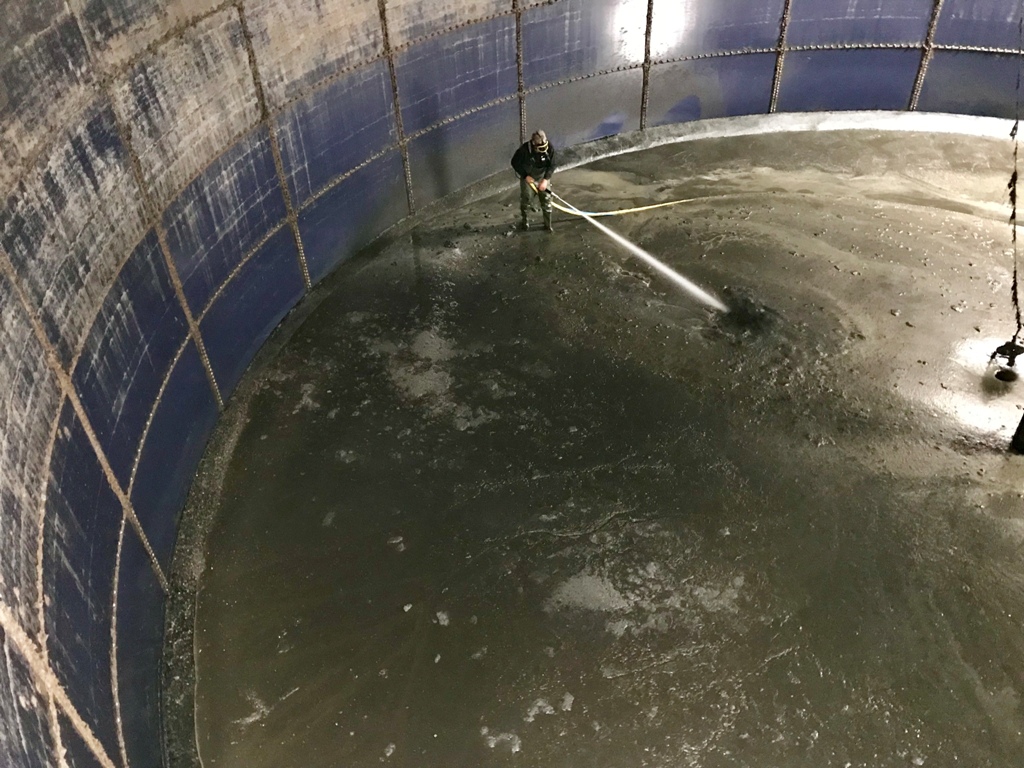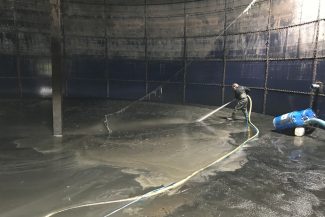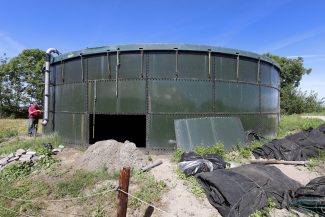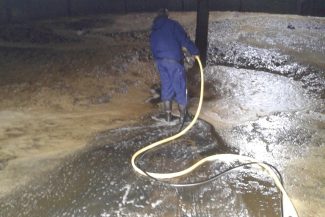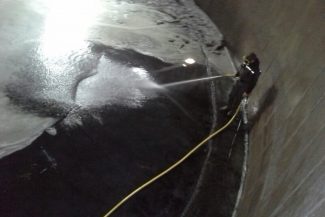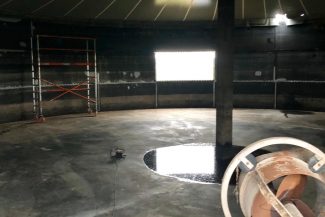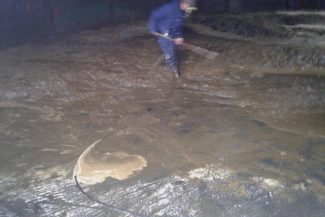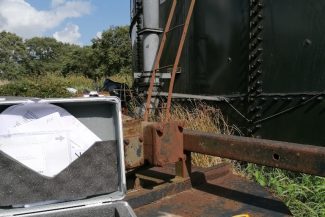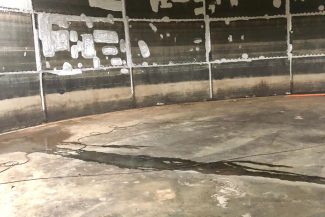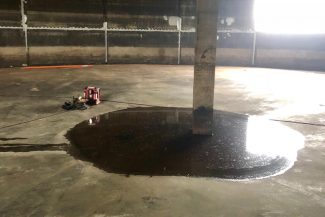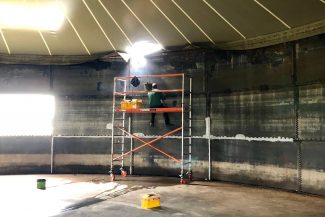Certified cleaning before the inspection
As of March 1, 2019, a new BRL 2344 is in effect. This BRL describes safe working with regard to the inspection of the manure silo. Every silo that has to be inspected internally must be pre-cleaned and spotless. Before this silo can be inspected, a cleaning certificate is required for the silo and the silo must be measured for possible gases present.
Accidents have happened in the past while cleaning manure silos. This new BRL makes it clear and transparent for everyone how an inspection should be carried out. As a client, you know exactly where you stand because there is no room for errors and unsafe inspections
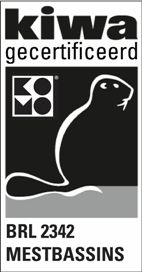
Internal manure silo inspection
Entering a manure silo (with or without a cover) should always be done with at least two people. Entering a confined space should therefore never be done alone. A certified man guard must be present.
Various gas measurements are taken both during and after cleaning. After cleaning the manure silo, a cleaning certificate is drawn up for the relevant silo.
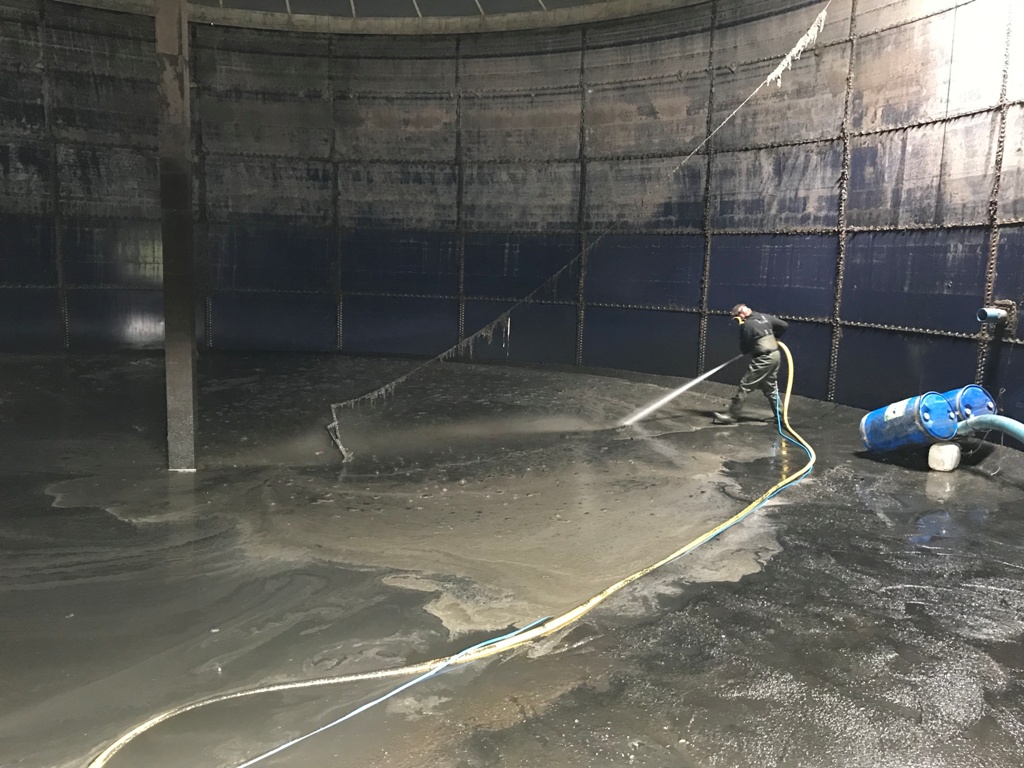
Gas measurement and clearance
At the time of an internal silo inspection, the silo must be spotless and gas-free. This means that an independent gas measurement must be performed before entering the silo after cleaning. The official statement of cleaning must also be handed over to the inspector.
Steel manure silo
Steel manure silos without an inner cover are required to be inspected internally. These silos are given a reference period of a maximum of 5 years. You are therefore also obliged to clean this silo (or have it cleaned) before the inspection itself takes place.
Concrete manure silo
A concrete manure silo can be internally inspected for a period of 10 years. In this case too, the silo must be cleaned beforehand and thus declared clean. Externally, a concrete manure silo may be inspected for 5 years. You are then not obliged to have the silo cleaned.
The great advantage of this new BRL is that an internal inspection of a manure silo is safe and certified. The inspector (and also the client himself) can safely enter the cleaned and gas-free silo. Nevertheless, the inspector must have the breathing equipment within reach when entering the silo. Gases can always be present in the silo. The inspector wears gas measuring equipment and, in the event of an alarm, can still wear the necessary breathing air equipment immediately.
This removes the entire risk and responsibility of the inspection from you as the client.
After an inspection, you are obliged to leave the silo clean for a week for a possible re-inspection. The KIWA can also view the silo during a random check.
Stappenplan inwendige reiniging en keuring
An internal inspection of a concrete silo and/or steel manure silo without an inner cover then looks like this:
- Internal cleaning manure silo
Declaration of cleaning of the cleaned silo - Gas measurement by independent gas metrist at the time of inspection
- Inspection by a KIWA certified company by two men: VCA certified inspector with breathing air, VCA certified man guard with breathing air
- Possible sample and re-check by KIWA
BRL 2344
In the new BRL 2344 it is described as follows:
An internal inspection can only be carried out if the manure basin has been cleaned by a cleaning company that is certified in accordance with the requirements of BRL-K906. If this is not the case, the following requirements must be met:
- The manure storage must be free of all liquid and solid residues. No residues may be present in all critical areas to be inspected;
- No damage to any internal coating may have occurred during the cleaning process;
Sufficient oxygen (18 – 21%) must be present in the manure storage; - All explosive gases must be below 10% LEL (CH4) and the toxic gases must be below the WG value (H2S, HCN, CO2, CO and NH3). This must be demonstrated by an independent expert who is in possession of a valid gas measurement diploma according to the SSVV training guide;
- A (own) undersigned statement that the manure basin has been cleaned, including all the above points.
Before entering the manure basin by the supplier, a gas measurement for oxygen and hydrogen sulphide must always be performed by a person who is in possession of a valid diploma for the Gas Measurement training according to the SSVV training guide.
Experienced partner
With more than 45 years of experience in all types of manure storage, we can rightly call ourselves an expert partner.
After such a long time in the manure storage, we have now built, inspected or repaired all types of systems. There is no problem is too big, or there is a suitable solution. We assist you with honest and sober advice.
Call us: 0512-582058
Contact
De Giek 31, 9206 AS Drachten
E-mail: [email protected]
Phone: +31(0)512-582058
Chamber of commerce: 01118484
For urgent matters, you can also reach us in the evening:
- Berend Jan Woltinge: +31613353506
- Jaap Veenstra: +31622495136

